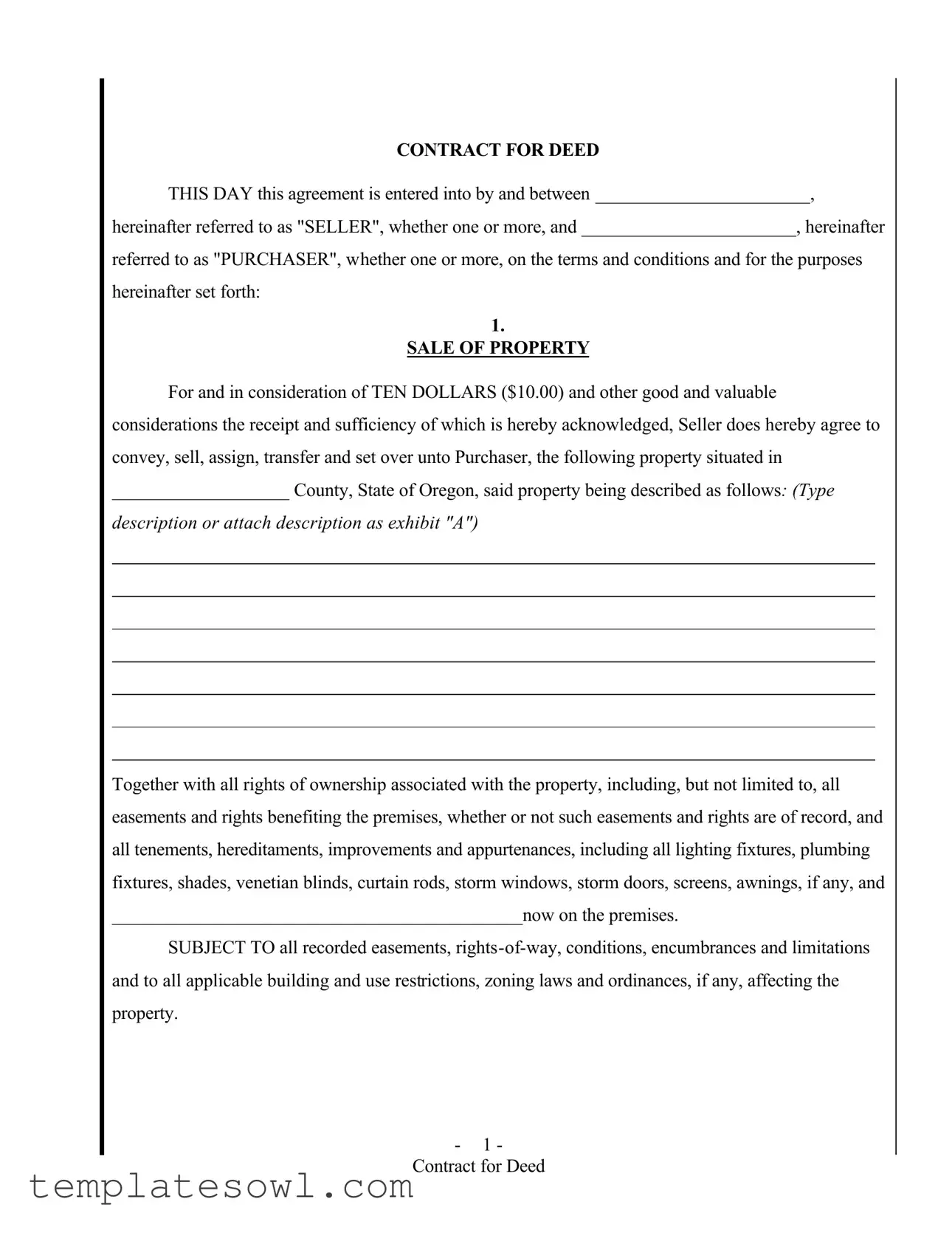Fill Out Your Contract For Deed Form
The Contract for Deed is an essential tool in real estate transactions, providing a distinct method for buyers and sellers to navigate property sales. This agreement involves two parties: the Seller, who offers the property, and the Purchaser, who agrees to buy it under specified terms. The contract outlines key elements, including a detailed description of the property, its sale price, and terms of payment. A unique aspect of this contract is its inclusion of the seller's financing, where the buyer may make installment payments directly to the seller, rather than securing a traditional mortgage. This can make homeownership more accessible for some individuals. Furthermore, the contract establishes responsibilities regarding property maintenance, insurance, and taxes. It clearly states that the Purchaser takes possession of the property upon execution, while emphasizing the "as-is" condition of the property, implying no warranties from the seller regarding its state. Overall, the Contract for Deed serves as a comprehensive document, balancing the interests of both parties and ensuring a transparent transaction process.
Contract For Deed Example

CONTRACT FOR DEED
THIS DAY this agreement is entered into by and between _______________________,
hereinafter referred to as "SELLER", whether one or more, and _______________________, hereinafter
referred to as "PURCHASER", whether one or more, on the terms and conditions and for the purposes hereinafter set forth:
1.
SALE OF PROPERTY
For and in consideration of TEN DOLLARS ($10.00) and other good and valuable considerations the receipt and sufficiency of which is hereby acknowledged, Seller does hereby agree to convey, sell, assign, transfer and set over unto Purchaser, the following property situated in
___________________ County, State of Oregon, said property being described as follows: (Type
description or attach description as exhibit "A")
Together with all rights of ownership associated with the property, including, but not limited to, all easements and rights benefiting the premises, whether or not such easements and rights are of record, and all tenements, hereditaments, improvements and appurtenances, including all lighting fixtures, plumbing fixtures, shades, venetian blinds, curtain rods, storm windows, storm doors, screens, awnings, if any, and
____________________________________________now on the premises.
SUBJECT TO all recorded easements,
- 1 -
Contract for Deed

2.
PURCHASE PRICE AND TERMS
The purchase price of the property shall be $____________________. The purchaser does
hereby agree to pay to the order of the Seller the sum of ___________________ Dollars
($_______________) upon execution of this agreement, with the balance of $__________________
being due and payable as follows:(Select one)
(a) Balance payable in __________ (_______) monthly installments of ______________
Dollars ($_________) each, with the first installment being due and payable on the ____ day of
_______________, 20____ and a like payment on the first day of each month thereafter until the
______ day of ________________, 20____, when the final payment shall be due. No interest.
(b) Balance payable, together with interest on the whole sum that shall be from time to time unpaid at the rate of _______ per cent, per annum, payable in the amount of $____________
dollars per month beginning on the _____ day of ____________, 20____ and continuing on the
same day of each month thereafter until fully paid.
(c) Balance payable, together with interest on the whole sum that shall be from time to time unpaid at the rate of _______ per cent, per annum, payable in the amount of
_____________________ dollars per month beginning on the ________ day of
_______________, 20____, and continuing on the same day of each month thereafter until the
______ day of _______________, 20____, when all remaining principal and interest shall be
paid. (Balloon payment)
If interest is charged, interest shall be computed monthly and deducted from payment and the balance of payment shall be applied on principal.
3.
TIME OF THE ESSENCE
Time is of the essence in the performance of each and every term and provision in this agreement by Purchaser.
- 2 -
Contract for Deed

4.
SECURITY
This contract shall stand as security of the payment of the obligations of Purchaser.
5.
MAINTENANCE OF IMPROVEMENTS
All improvements on the property, including, but not limited to, buildings, trees or other improvements now on the premises, or hereafter made or placed thereon, shall be a part of the security for the performance of this contract and shall not be removed there from. Purchaser shall not commit, or suffer any other person to commit, any waste or damage to said premises or the appurtenances and shall keep the premises and all improvements in as good condition as they are now.
6.
CONDITION OF IMPROVEMENTS
Purchaser agrees that the Seller has not made, nor makes any representations or warranties as to the condition of the premises, the condition of the buildings, appurtenances and fixtures locate thereon, and/or the location of the boundaries. Purchaser accepts the property in its
7.
POSSESSION OF PROPERTY
Purchaser shall take possession of the property and all improvements thereon upon execution of this contract and shall continue in the peaceful enjoyment of the property so long as all payments due under the terms of this contract are timely made. Purchaser agrees to keep the property in a good state of repair and in the event of termination of this contract, Purchaser agrees to return the property to Seller in substantially the same condition as it now exists, ordinary wear and tear excepted. Seller reserves the right to inspect the property at any time with or without notice to Purchaser.
8.
TAXES, INSURANCE AND ASSESSMENTS
Taxes and Assessments: During the term of this contract:(Select one)
- 3 -
Contract for Deed

(a) Purchaser shall pay all taxes and assessments levied against the property.
(b) Seller shall pay all taxes and assessments levied against the property. In the event that Seller pays the taxes and insurance, Purchaser shall reimburse Seller for same upon 30 days notice to purchaser.
Content Insurance: Purchaser shall be solely responsible for obtaining insurance of the contents, insuring contents owned by Purchaser. Seller shall be solely responsible for obtaining insurance on all contents owned by Seller.
Liability and Hazard Insurance: Liability insurance shall be maintained by Purchaser during the term of this contract naming Seller as an additional insured, in the amount of not less than $________________.
Fire, Hazard and Windstorm insurance: Fire, hazard and windstorm insurance shall be maintained as follows: (Select one)
(a) Purchaser shall obtain fire, hazard and windstorm insurance in the amount not less than $_______________, on a policy of insurance naming Seller as additional insured.
(b) Seller shall obtain and pay for hazard, fire and windstorm insurance in an amount not less than $ _________________. In the event Seller elects this option, Purchaser shall repay the
amount so paid by Seller within thirty (30) days of demand for same by Seller.
Should the Purchaser fail to pay any tax or assessment, or installment thereof, when due, or keep said buildings insured, Seller may pay the same and have the buildings insured, and the amounts thus expended shall be a lien on said premises and may be added to the balance then unpaid, or collected by Seller, in the discretion if Seller with interest until paid at the rate of the ______________ per cent per
annum.
In case of any damage as a result of which said insurance proceeds are available, the Purchaser may, within sixty (60) days of said loss or damage, give to the Seller written notice of Purchaser’s election to repair or rebuild the damaged parts of the premises, in which event said insurance proceeds shall be used for such purpose. The balance of said proceeds, if any, which remain after completion of said repairing or rebuilding, or all of said insurance proceeds if the Purchaser elects not to repair or rebuild, shall be applied first toward the satisfaction of any existing defaults under the terms of this contract, and then as a prepayment upon the principal balance owing. No such prepayment shall defer the time for payment of any remaining payments required by said contract. Any surplus of said proceeds
- 4 -
Contract for Deed

in excess of the balance owing hereon shall be paid to the Purchaser.
- 5 -
Contract for Deed

9.
DEFAULT
If the Purchaser shall fail to perform any of the covenants or conditions contained in this contract on or before the date on which the performance is required, the Seller shall give Purchaser notice of default or performance, stating the Purchaser is allowed fourteen (14) days from the date of the Notice to cure the default or performance. In the event the default or failure of performance is not cured within the
14 day time period, then Seller shall have any of the following remedies, in the discretion of Seller:
(a)give the Purchaser a written notice specifying the failure to cure the default and informing the Purchaser that if the default continues for a period of an additional fifteen (15) days after service of the notice of failure to cure, that without further notice, this contract shall stand cancelled and Seller may regain possession of the property as provided herein; or
(b)give the Purchaser a written notice specifying the failure to cure the default and informing the Purchaser that if the default continues for a period of an additional fifteen (15) days after service of the notice of failure to cure, that without further notice, the entire principal balance and unpaid interest shall be immediately due and payable and Seller may take appropriate action against Purchaser for collection of same according to the laws of the State of
____________________.
In the event of default in any of the terms and conditions or installments due and payable under
the terms of this contract and Seller elects 9(a), Seller shall be entitled to immediate possession of the property.
In the event of default and termination of the contract by Seller, Purchaser shall forfeit any and all payments made under the terms of this contract including taxes and assessments as liquidated damages, Seller shall be entitled to recover such other damages as they may be due which are caused by the acts or negligence of Purchaser.
The parties expressly agree that in the event of default not cured by the Purchaser and termination of this agreement, and Purchaser fails to vacate the premises, Seller shall have the right to obtain possession by appropriate court action.
- 6 -
Contract for Deed

10.
DEED AND EVIDENCE OF TITLE
Upon total payment of the purchase price and any and all late charges, and other amounts due Seller, Seller agrees to deliver to Purchaser a Warranty Deed to the subject property, at Seller’s expense, free and clear of any liens or encumbrances other than taxes and assessments for the current year.
11.
NOTICES
All notices required hereunder shall be deemed to have been made when deposited in the U. S. Mail, postage prepaid, certified, return receipt requested, to the Purchaser or Seller at the addresses listed below. All notices required hereunder may he sent to:
Seller:
Purchaser:
and when mailed, postage prepaid, to said address, shall be binding and conclusively presumed to be served upon said parties respectively.
12.
ASSIGNMENT OR SALE
Purchaser shall not sell, assign, transfer or convey any interest in the subject property or this agreement, without first securing the written consent of the Seller.
- 7 -
Contract for Deed

13.
PREPAYMENT
Purchaser to have the right to prepay, without penalty, the whole or any part of the balance remaining unpaid on this contract at any time before the due date.
14.
ATTORNEY FEES
In the event of default, Purchaser shall pay to Seller, Seller's reasonable and actual attorneys' fees and expenses incurred by Seller in enforcement of any rights of Seller. All attorney fees shall be payable prior to Purchaser's being deemed to have corrected any such default.
15.
LATE PAYMENT CHARGES
If Purchaser shall fail to pay, within fifteen (15) days after due date, any installment due hereunder, Purchaser shall be required to pay an additional charge of five (5%) percent of the late installment. Such charge shall be paid to Seller at the time of payment of the past due installment.
16.
CONVEYANCE OR MORTGAGE BY SELLER
If the Seller's interest is now or hereafter encumbered by mortgage, the Seller covenants that Seller will meet the payments of principal and interest thereon as they mature and produce evidence thereof to the Purchaser upon demand. In the event the Seller shall default upon any such mortgage or land contract, the Purchaser shall have the right to do the acts or make the payments necessary to cure such default and shall be reimbursed for so doing by receiving, automatically, credit to this contract to apply on the payments due or to become due hereon.
The Seller reserves the right to convey, his or her interest in the above described land and such conveyance hereof shall not be a cause for rescission but such conveyance shall be subject to the terms of this agreement.
- 8 -
Contract for Deed

The Seller may, during the lifetime of this contract, place a mortgage on the premises above described, which shall be a lien on the premises, superior to the rights of the Purchaser herein, or may continue and renew any existing mortgage thereon, provided that the aggregate amount due on all outstanding mortgages shall not at any time be greater than the unpaid balance of the contract.
17.
ENTIRE AGREEMENT
This Agreement embodies and constitutes the entire understanding between the parties with respect to the transactions contemplated herein. All prior or contemporaneous agreements, understandings, representations, oral or written, are merged into this Agreement.
18.
AMENDMENT – WAIVERS
This Agreement shall not be modified, or amended except by an instrument in writing signed by all parties.
No delay or failure on the part of any party hereto in exercising any right, power or privilege under this Agreement or under any other documents furnished in connection with or pursuant to this Agreement shall impair any such right, power or privilege or be construed as a waiver of any default or any acquiescence therein. No single or partial exercise of any such right, power or privilege shall preclude the further exercise of such right, power or privilege, or the exercise of any other right, power or privilege. No waiver shall be valid against any party hereto unless made in writing and signed by the party against whom enforcement of such waiver is sought and then only to the extent expressly specified therein.
19.
SEVERABILITY
If any one or more of the provisions contained in this Agreement shall be held illegal or unenforceable by a court, no other provisions shall be affected by this holding. The parties intend that in the event one or more provisions of this agreement are declared invalid or unenforceable, the remaining
- 9 -
Contract for Deed

provisions shall remain enforceable and this agreement shall be interpreted by a Court in favor of survival of all remaining provisions.
20.
HEADINGS
Section headings contained in this Agreement are inserted for convenience of reference only, shall not be deemed to be a part of this Agreement for any purpose, and shall not in any way define or affect the meaning, construction or scope of any of the provisions hereof.
21.
PRONOUNS
All pronouns and any variations thereof shall be deemed to refer to the masculine, feminine, neuter, singular, or plural, as the identity of the person or entity may require. As used in this agreement:
(1)words of the masculine gender shall mean and include corresponding neuter words or words of the feminine gender, (2) words in the singular shall mean and include the plural and vice versa, and (3) the word "may" gives sole discretion without any obligation to take any action.
22.
JOINT AND SEVERAL LIABILITY
All Purchasers, if more than one, covenants and agrees that their obligations and liability shall be joint and several.
23.
PURCHASER’S RIGHT TO REINSTATE AFTER ACCELERATION
If Purchaser defaults and the loan is accelerated, then Purchaser shall have the right of reinstatement as allowed under the laws of the State of Oregon, provided that Purchaser: (a) pays Lender all sums which then would be due under this agreement as if no acceleration had occurred; (b) cures any default of any other covenants or agreements; and (c) pays all expenses incurred in enforcing this agreement, including, but not limited to, reasonable attorneys' fees, and other fees incurred for the purpose of protecting Seller's interest in the Property and rights under this agreement. Seller may require that Purchaser pay such reinstatement sums and expenses in one or more of the following forms, as
- 10 -
Contract for Deed
Form Characteristics
| Fact Name | Details |
|---|---|
| Definition | A Contract for Deed is an agreement where the seller retains the title of the property until the buyer completes payment, offering a means of financing real estate purchases. |
| Governing Law | In Oregon, the relevant laws governing Contracts for Deed are found under Oregon Revised Statutes, specifically ORS Chapter 93 and ORS Chapter 87.703. |
| Purchase Price | The purchase price is specified in the contract and may include a mix of upfront payment and installment payments over a defined term. |
| Possession Rights | Upon signing the agreement, the purchaser typically gains immediate possession of the property while making payments according to the contract terms. |
| Maintenance Responsibilities | The purchaser must maintain the property and cannot commit waste, ensuring it remains in good condition throughout the contract term. |
| As-Is Clause | Purchasers accept the property in its "as-is" condition, meaning they cannot hold the seller liable for any defects or issues with the property. |
| Taxes and Insurance | The agreement outlines responsibilities for taxes and insurance, which can vary. The purchaser usually pays taxes and is responsible for obtaining appropriate insurance coverage. |
Guidelines on Utilizing Contract For Deed
After this form is filled out, both the Seller and Purchaser should review it carefully to ensure all details are accurate. This contract formalizes the agreement between the parties regarding the sale of the specified property. Follow these steps to complete the Contract for Deed form properly.
- Enter the date of the agreement in the designated area.
- Fill in the names of the Seller(s) in the first blank space.
- Fill in the names of the Purchaser(s) in the second blank space.
- In the property description section, specify the location and details about the property or attach an exhibit if necessary.
- State the purchase price of the property in the specified blank.
- Indicate the amount due upon execution of the agreement in the respective blank.
- For the balance of the purchase price, choose the payment option that applies:
- a) If paying in monthly installments, fill in the number of installment payments, the amount of each installment, and the due dates.
- b) If interest applies, enter the interest rate and monthly payment amount along with the payment schedule.
- c) If a balloon payment is selected, include the total monthly payment and final payment due date.
- Specify that time is of the essence for the Purchaser regarding payment terms.
- Note that this contract serves as security for purchase obligations in the appropriate section.
- Indicate the condition of the property and acknowledge acceptance in its “as-is” condition.
- State the responsibilities regarding the maintenance of improvements on the property.
- Specify who will be responsible for taxes and insurance, and fill in any required amounts.
- Ensure that all parties sign the document upon completion and consider having it notarized for additional legal standing.
What You Should Know About This Form
What is a Contract For Deed?
A Contract For Deed is a type of real estate agreement in which the seller allows the buyer to make payments while enjoying possession of the property. This arrangement typically means that the buyer does not receive the title to the property until all payments are made. In essence, it's a way for buyers to secure a property without needing a traditional mortgage, but they remain responsible for payments and upkeep throughout the contract period.
What are the key components of a Contract For Deed?
This agreement includes several crucial elements: the identification of the seller and purchaser, a detailed description of the property being sold, the purchase price, and the payment terms. The contract will also cover the condition of the property, responsibilities regarding taxes and insurance, and any penalties for non-compliance. Understanding these details is vital to ensure that both parties are aware of their rights and obligations.
Who is responsible for taxes and insurance during the contract?
The responsibility for taxes and insurance can vary depending on the agreement between the seller and purchaser. The contract will specify whether the purchaser pays all taxes and assessments or if the seller will handle those expenses. If the seller pays, the purchaser is expected to reimburse them after receiving notice. It's crucial to clarify this in the contract to avoid any misunderstandings or unexpected financial burdens.
What happens if the purchaser fails to make payments on time?
Time is of the essence in this agreement, which means timely payments are crucial. If the purchaser fails to make payments as agreed, the seller may have the right to terminate the contract. This could result in the loss of any equity built up by the purchaser. Additionally, the seller may have the option to reclaim the property, so it’s vital for purchasers to stay current with their payments to avoid these consequences.
Can the purchaser make changes to the property?
While the purchaser has possession of the property, they may generally make improvements. However, the contract typically states that the property must be maintained in good condition and that significant alterations should not be made without the seller’s consent. It helps to keep communication open regarding any planned changes to ensure compliance with the terms of the agreement.
How can disputes be resolved in a Contract For Deed?
The contract may include provisions outlining how disputes will be resolved, such as mediation or arbitration. If the contract lacks this section, the parties may need to pursue legal action in court, which can be a long and costly process. It's beneficial to anticipate potential disputes and include a clear resolution method in the agreement, allowing for smoother proceedings should any issue arise.
Common mistakes
When filling out the Contract For Deed form, one common mistake is failing to provide a complete description of the property. The section specifically asks for a detailed description or to attach an exhibit labeled "A." Without this crucial information, the contract may lack clarity and become legally problematic. Vendors may potentially face disputes or issues in the future, unable to clearly define what property was sold.
Another mistake often observed is in the area of payment terms. Individuals sometimes overlook signing or selecting the correct payment option. The form offers several choices for payment, such as monthly installments without interest or a balloon payment. Not clearly indicating the agreed-upon terms can lead to confusion and disputes later on. Always ensure that the correct amounts and terms are accurately filled to avoid financial misunderstandings.
Additionally, purchasers sometimes neglect to take note of their responsibilities regarding taxes and insurance. This section demands careful attention. If misinterpreted, it could lead to financial burdens. For example, if the purchaser assumes that the seller will cover taxes when, in fact, the contract states otherwise, serious financial consequences might arise. Understanding and acknowledging tax payment obligations is essential for both parties.
Finally, some individuals mistakenly ignore the property maintenance clause. This clause requires the purchaser to keep the premises in good condition and prohibits them from committing waste. Neglecting this term can lead to deteriorating property conditions, potentially resulting in disputes over repairs or damages. Adhering to the maintenance obligations set forth in the contract ensures that the property remains in acceptable condition and protects the interests of both the seller and purchaser.
Documents used along the form
When engaging in a Contract for Deed transaction, several additional forms and documents may be necessary to ensure a smooth process. Understanding these supplementary documents is crucial for both buyers and sellers. Here’s a list of commonly used forms that often accompany the Contract for Deed:
- Promissory Note: This document outlines the buyer's promise to repay the seller for the loan amount, detailing the interest rate, payment schedule, and consequences for missed payments.
- Deed of Trust: This serves as a security agreement, providing the seller a claim on the property until the buyer fulfills their payment obligations. It involves a third party, often a trustee, who holds the property title during the loan period.
- Affidavit of Title: This sworn statement confirms the seller's legal ownership of the property and that there are no undisclosed liens or claims against it, assuring the buyer of a clear title.
- Property Disclosure Statement: Sellers must provide this document to inform buyers about any known issues with the property, ensuring transparency and helping to avoid future disputes.
- Insurance Agreement: This outlines the responsibility for property insurance, specifying whether the seller or buyer will obtain coverage for the property during the contract period.
- Lead-Based Paint Disclosure: Required for homes built before 1978, this document informs buyers of potential lead paint hazards and provides guidelines for its management.
- Inspection Report: This is often obtained by buyers before finalizing the purchase. It assesses the property's condition and can identify any necessary repairs or improvements, allowing for informed decision-making.
These documents play critical roles in protecting the interests of both the seller and the buyer. Understanding each one will help ensure that the transaction progresses smoothly and that both parties are adequately informed of their rights and responsibilities.
Similar forms
The Contract For Deed form shares similarities with several other legal documents related to property transactions. Here’s a breakdown of these documents and how they relate to a Contract For Deed:
- Purchase Agreement: Like a Contract For Deed, a purchase agreement outlines the terms under which a buyer agrees to purchase property. It specifies the price, payment terms, and conditions of the sale. However, a purchase agreement typically requires the buyer to pay the full amount upfront or arrange for traditional financing, rather than installment payments over time.
- Security Agreement: This document is used to secure a loan with collateral, similar to a Contract For Deed, which uses the property itself as security for the seller’s financing. Both agreements protect the seller's interests by ensuring that the buyer cannot walk away from the obligation without consequences.
- Lease with Option to Purchase: This arrangement allows a tenant to lease a property with the option to buy it later. Both documents aim to facilitate eventual ownership of the property. However, a lease option allows the tenant to try out the property before committing to a purchase, while a Contract For Deed usually transfers possession and responsibilities right away.
- Mortgage Agreement: This document involves a loan to purchase property, with the property serving as collateral. A mortgage agreement requires the borrower to repay the loan over time, similar to the installment payments of a Contract For Deed. The main difference lies in the ownership structure; with a mortgage, full title usually remains with the seller until payment is complete, while a Contract For Deed allows the buyer some ownership rights during the term of the agreement.
Dos and Don'ts
Do's when filling out the Contract For Deed form:
- Ensure all names are correctly spelled and accurate for both the Seller and Purchaser.
- Clearly define the property being sold, including a detailed description.
- Specify the purchase price and payment terms clearly and accurately.
- Indicate the payment schedule clearly to avoid confusion later.
- Provide an "as-is" acceptance clause, ensuring the Purchaser understands the property condition.
- Keep a copy of the signed contract for your records.
- Review the agreement thoroughly before signing.
- Discuss and agree on responsibilities for property taxes and insurances upfront.
- Sign and date the contract to make it legally binding.
- Consult with a legal professional if you have any questions or concerns.
Don'ts when filling out the Contract For Deed form:
- Do not leave any blank spaces in the contract; every section should be filled out.
- Avoid vague descriptions of the property or terms of sale.
- Do not rush through the agreement; take your time to ensure accuracy.
- Never ignore the importance of signatures from both parties.
- Do not neglect to clarify who will pay for maintenance and repairs.
- Avoid assumptions about the state of the property without inspections.
- Do not skip discussing potential rights of access or inspection.
- Do not forget to outline what happens if payments are missed.
- Never ignore state laws regarding real estate contracts.
- Avoid boilerplate language that may not fit your specific needs.
Misconceptions
There are several misconceptions surrounding the Contract For Deed form. Understanding these can help clarify your decisions. Here is a list of some common misconceptions:
- It guarantees ownership immediately. A Contract For Deed does not transfer ownership of the property until the purchase price is fully paid.
- It requires no down payment. Most agreements include a down payment, showing the buyer's commitment to the purchase.
- No interest is charged. While some contracts may not include interest, many do. It depends on the specific terms outlined in the agreement.
- The seller must maintain the property. The purchaser is generally responsible for property maintenance, even if ownership has not yet transferred.
- You can default without consequences. If the purchaser fails to make payments, the seller can reclaim the property through repossession.
- The seller has no rights during the contract. Sellers retain rights to inspect the property and enforce contract terms.
- All improvements belong to the buyer. Improvements made to the property typically serve as security for the seller until the contract is fulfilled.
- The buyer can assume any tax responsibility. Tax responsibility can vary based on the agreement. Often, it is stated clearly in the contract.
- The contract can be ignored if conditions change. Once signed, the terms of the contract must be followed unless both parties agree to modifications.
Understanding these misconceptions can lead to more informed decisions. Always review the terms of the Contract For Deed with care and consider seeking legal advice if needed.
Key takeaways
Filling out and utilizing a Contract for Deed form requires careful attention to various aspects of the agreement. Here are four key takeaways that can help ensure a smooth transaction:
- Property Description: Clearly describe the property being sold, including all rights and appurtenances associated with it. Avoid vague language; include specifics to prevent potential disputes.
- Payment Terms: Define the purchase price and establish clear payment terms. Whether opting for a lump sum, monthly installments, or a balloon payment, clarity is essential to mitigate misunderstandings later.
- Maintenance Responsibilities: Acknowledge that the purchaser is responsible for maintaining the property. The contract stipulates that the premises should be kept in good condition, which protects both parties' interests.
- As-Is Condition: Understand that the property is accepted in its current condition without warranties from the seller. This means the purchaser assumes any risks related to potential issues or defects.
Browse Other Templates
Wedding Party List Template - This form serves as a roadmap for wedding day introductions and activities.
Legal Guardian Paperwork - Required information includes names, addresses, and birth dates of individuals involved.
Mvu24 - Review your local tax regulations before submitting this form.
